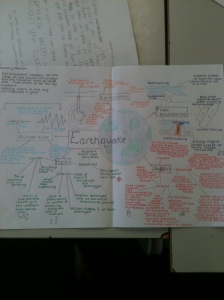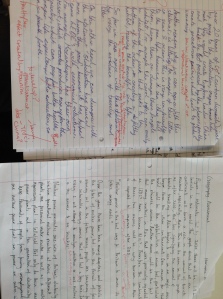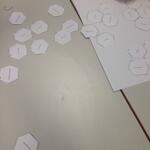It’s every teacher’s job to teach literacy and to teach it well. I’d argue as a geography teacher that literacy is more important than the geographical knowledge I teach. Reading David Didau’s book ‘The Secret of Literacy’ recently has helped me to consolidate my thoughts and to plan effectively for literacy. Ideologically, I want to avoid ‘The Matthew Effect’ by helping students of all social backgrounds to become word rich. I must ensure students become good at writing, reading and speaking like a geographer.
I work in a school where EAL is high and improving student’s academic register is important. I must ensure students learn new geographical words by teaching them what they mean and encouraging use of academic language in their speech and writing. Using cumulative knowledge tests will hopefully help students to retain the geographical language they need to become geographical thinkers. Multiple choice tests can be created using an app called ‘socrative’. Id aim to give students 10 key words/concepts to learn in each unit and then the test becomes cumulative through the year to 60 words. It is important for the teacher to explain ‘threshold concepts’ well. The concept of ‘sustainable development’ is a running theme through the year 7 scheme of work and ‘globalisation’ through the year 8 scheme. Students are now confidently using this language in their explanations and linking to different areas of geography. By having a thorough understanding of globalisation students can use this to explain areas such as deindustrialisation in Detroit to outsourcing and labour issues in developing countries. See my geography overview here including cumulative concepts. https://hackthecurriculum.wordpress.com/2014/06/03/a-geography-overview/
It is vital for students to be able to write well in geography in preparation for exams (pragmatic rehearsal) for example. We should all want students to master written skills they have been taught and to practice to avoid ‘encoding failure’ i.e. being well practiced that they use capital letters in the correct places and so on. By work being referred to as a draft students are in the mindset that they will have to do more than one version to achieve mastery, developing a growth mindset. I’d like students to draft four 300 word essays each year in years 7, 8 and 9. I’d expect that some students to create multiple drafts even upto 5 or 6 before they have produced a concise and accurate piece. These pieces could be varied in geography. Students might be writing about the causes and effects of a disaster to a balanced argument over nuclear energy for example. We want students to have written a natural and flowing piece of work that sometimes can’t be achieved when work is over scaffolded for example using excessive writing frames or PEE paragraphs. PEE can be too formulaic and writing frames should not be used to make work easier. Using David Didaus ‘slow writing’ techniques can help students to think about how they are writing (read his book to find out how).
By student’s word processing their final drafts, or even the teacher completing written assignments with the students, models are created to show students how it’s done. Students can then see the outcome expected and remix ideas to create their own piece. Using visual organisers for students to plan out their thoughts can also help students with a written assignment such as hexagons, concept maps, timelines, flow maps, cause and effect trees etc.

In a first draft I’d expect students to proofread their work and this to become habitual. Students have a helpful guide to literacy on their desk to refer to that helps them do this. Using a green pen to check SPAG and another technique would be to train students to use a black marker to cross out redundant/repetition in their work (black spacing). Marking an essay during the drafting stage is also highly effective. Students can be trained to critique work using a gallery critique method (read Ron Berger’s work). They can give kind, helpful and specific comments and these are used to improve their own work at the same time as having the opportunity to look at other models. This is a very powerful technique when used well and co-constructed success criteria and models help students to give detailed feedback. It also is useful for general presentation of work in books when students are empowered to critique. Telling students to improve their presentation in an authoritarian way does not work from my experience.
The role of the teacher would be to mark essays too and thoroughly. When students are writing independently I like them to come and show me their drafts once complete (and proofread) and I will annotate with further questions to develop their thinking and check for nominalisation and formal language. This creates a dialogue with the student. Although my school encourage the use of WWW and EBI, I do have reservations that this does not lead to dialogue and thought from the student about how to improve their work. Essentially, I want students to write and think like a geographer so asking geographical questions will help them to do this. Ultimately, marking thoroughly is a form of differentiation because I will be asking different questions to different pupils whom I know well. It also helps inform planning and demonstrates how well students understand a particular topic and if they are ready to move on.

High expectations of students oracy is crucial, we want students to be strong and confident communicators in an ever competitive world. Strong communication comes from a teacher who can model academic language and its use, through strong probing and dialogical questioning. I encourage students to use academic language and ask them to repeat themselves if I think a concept/word should be substituted for something more informal. E.g. “deforestation” replaces “trees are chopped down”. Teaching students how to nominalise by seeing the difference between everyday speech and academic speech can increase student’s life chances. Techniques like Socratic circles can help improve student’s oracy and hot seating is also powerful for a dialogue between an individual and the teacher/class.
https://www.teachingchannel.org/videos/teaching-the-n-word
Students are also expected to access geographical texts. My lessons often involve research through a project based approach. When students are using ipads for example it is important to model and train how to research effectively, but also skimming, scanning and zooming are important techniques to remind students about. I have modelled using an ipad and apple tv how to skim and scan various online texts. The role of a teaching assistant can be helpful in research lessons. When the teacher could work with weaker students in a group using guided reading for example, the teaching assistant could be checking other students are using different sources and summarising what each source is saying using quotation where necessary. Further reading culture should be encouraged, I have wider reading suggestions for students for each unit that I share with students. I’d like to think all students will read at least one geographical book each year based on my recommendation.
I think geographical knowledge is essential for all students. Knowledge of what is happening in the world in terms of geopolitics, environmentalism and so on increase students cultural capital. It allows students to access society and to demonstrate shared values. My lessons are becoming more minimally viable. There are certain structures to a scheme of work that engage students such as an authentic outcome. Working towards these outcomes through a focus on learning how to speak, read and write effectively using a finite amount of strategies to support them is preferable to gimmicky activities (card sorts, games etc.) that do not deepen students understanding.

nice nice.